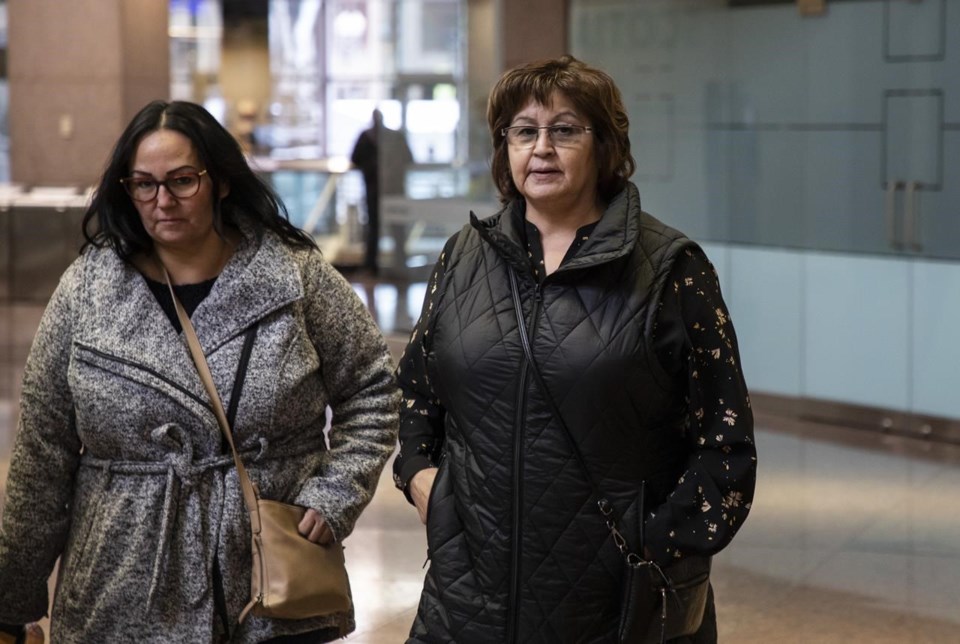EDMONTON — A woman from Saddle Lake Cree Nation was in Federal Court Tuesday fighting for her right to vote in band elections.
The Indigenous community about 170 kilometres northeast of Edmonton has regulations that prevent descendants of Indigenous women who have married non-status men from voting in its elections.
Last week, the Federal Court ordered neighbouring Whitefish Lake First Nation to change its election regulations after two women argued they were being discriminated against for similar reasons.Â
The two First Nations have an intricate history. The federal government considers Whitefish Lake to be a reserve that is part of Saddle Lake, even though each has its own chief and council.
Karen McCarthy and Lorna Jackson-Littlewolfe sought a judicial review of Whitefish Lake's election and membership regulations in 2022.
Justice Paul Favel said in a written decision on Feb. 15 that McCarthy was unable to vote in band elections because her mother married a non-status man, stripping her of her status. The Bill to Amend the Indian Act reinstated status to women and their children in 1985.Â
However, members of Whitefish Lake First Nation who had their status reinstated were still not entitled to vote in band elections. The First Nation argued that the rule is a custom, and has been so since 1985, while Favel found it to be an outdated fragment of the Indian Act that has been carried on after the amendment.
A hearing into a judicial application from Gail Collins to change those rules in Saddle Lake Cree Nation wrapped Tuesday and Justice Guy Regimbald said there would be a decision at a later date.
"It's a knowing willingness to not accept us," said McCarthy after the hearing, where she came to support Collins. "My issue doesn't have to do with the election law. It has to do with my right to vote, to be recognized as a full band member."
McCarthy said leaders make conscious decisions as to who to have on the voting list so they can maintain their place in council.
"Intentionally leaving band members off of the voters' list has been a common practice for them since 1985," said McCarthy. "No one has stood up to challenge them."
Jackson-Littlewolfe accepted her nomination as a candidate for band council election on April 15, 2021, Favel said in his judgment. Five days later, the Chair of the Committee advised Jackson-Littlewolfe that she was not an eligible candidate because she was in a common-law marriage. The First Nation said that the Common Law Marriage Prohibition is a traditional custom that was adopted by the teachings of the Methodist Church in the late 1800s.
On Feb. 15, court found two parts of the Bill to Amend the Indian Act — its voting policy and common-law marriage prohibition — to be unconstitutional and not customary, and of no force and effect for upcoming elections in the Whitefish Lake First Nation.
A key question in both hearings has been whether Whitefish Lake First Nation and Saddle Lake Cree Nation should be treated as one entity or not.
Orlagh O'Kelly, a lawyer who represented McCarthy and Collins, is hopeful last week's decision in McCarthy's case will bode well for Collins.Â
"I think it was a good decision because obviously it's had lasting effects on the women and the descendants of women in Whitefish," said O'Kelly.
O'Kelly said people who are prevented from voting can face socio-economic disadvantages and a loss of culture.
"These colonial practices have left their mark on these communities and their sense of belonging. There's definitely an us-versus-them thing going on."
O'Kelly added that the situation in Whitefish Lake reflects a much bigger picture that First Nations across the country are facing.
This report by The Canadian Press was first published Feb. 21, 2023.
—
This story was produced with the financial assistance of the Meta and Canadian Press News Fellowship.
Angela Amato, The Canadian Press




